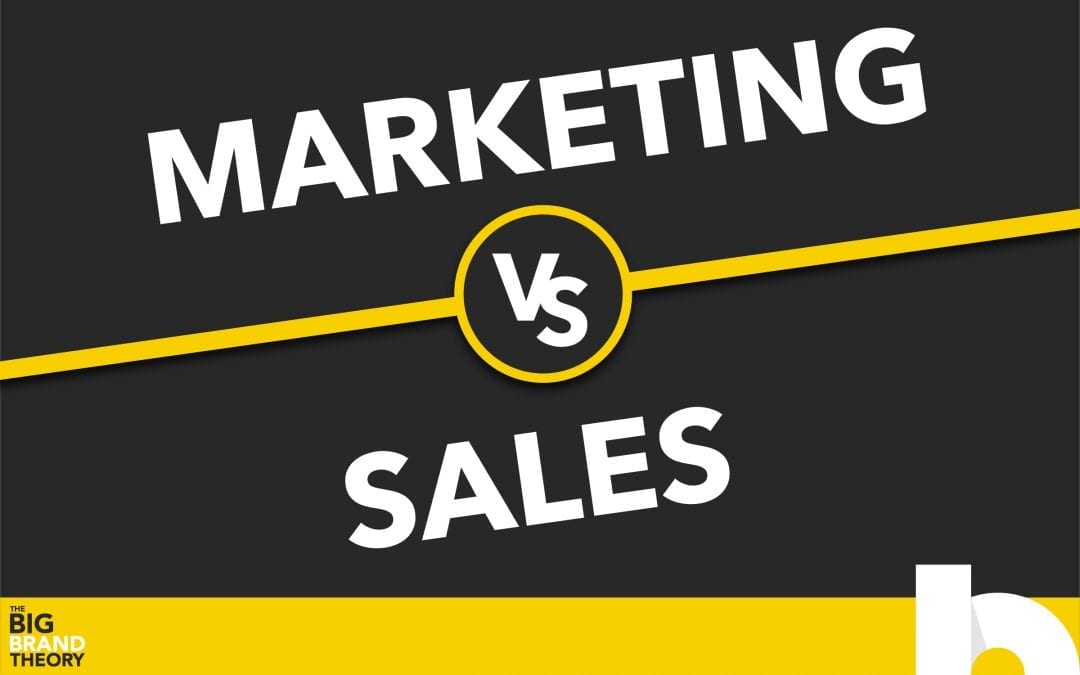Editor’s note: Hey, folks! Our team at Blackwood has launched a podcast called The Big Brand Theory, and we’re currently doing a “Marketing Vs.…” series. If you’d prefer to listen to the episode about Marketing vs. Sales, you can do so at this link. Enjoy!!
Marketing and sales have a lot in common, and they’re often seen as super closely related. However, there’s a reason there are often employees handling each specifically: both marketing and sales have so many different aspects to them. They do absolutely work together frequently in businesses, though. Let’s take a look at Marketing vs. Sales and what the two bring to the table.
What are the basic definitions of marketing and sales?
There are a lot of nitty-gritty details involved with both marketing and sales, but Hubspot does a great job of giving a basic definition to each term. According to them, sales includes all activities that lead to the selling of goods and services. Marketing, though, is the process of getting people interested in those particular goods and/or services. Essentially, marketing’s job is to lead people into the process of sales.
Why does every business need someone in charge of each?
If you’re trying to do both jobs simultaneously and relying on cold calls to drive leads, you’re wearing yourself out unnecessarily. Marketers and salespeople both have access to so many job-specific resources that will help make your business run more efficiently. After all, the answer to, “do you want more leads?” is always, “YES!” Whether you decide to have an in-house marketing team or hire an agency, allowing the marketing team to generate interest in the best, most efficient ways possible will guarantee more warm leads for your business. Having two different people in charge of either job can literally gain you more clients!
How should you pick out your strategy for marketing and for sales?
First, let’s talk about inbound versus outbound strategy. Now, this depends on the type of company, but in most cases, the outbound aspect is a salesperson going out and generating leads and ultimately making sales. Inbound marketing, though, is figuring out how to get the sales to come to you. Then, of course, the sales part comes in when that generated interest converts into a sale. The most effective way to do so is to have a specific marketing team that preps and warms the leads, and then a sales team to come in and complete the transaction.
The bottom line to creating your first strategy is simple. If you aren’t energetic about doing a lot of work to get the word out there when you start a company, it’s going to be very difficult for you to gain clientele and make it work. You really have to be a go-getter; you may have to do both jobs at the start.
Marketing and sales may look different between B2B and B2C companies.
The type of client you’re trying to reach will definitely shape the way you go about your marketing and sales strategies. In most of the B2B environment, the one-one-one sales are going to take precedent. As far as flower shops, bakeries, and other similar companies, marketing is going to be the most vital part of your success. Always shape your advertisements toward your target audience. Those are the most likely people who will convert and complete a transaction, so you want to reach as many of those people as possible. For B2B, your target market is likely a lot more specific; in the same way, you should tailor your ads to your niche in order to bring in more sales and more leads.
Of course, if your company falls somewhere more along the center of the spectrum, it may be best to test out both marketing and sales strategies. That way, you can determine what works best for your business and focus more attention in that area to maximize conversions.
How do marketing and sales work together?
Well, it’s sort of what we’ve touched on before. Marketing is the way to open up the door for your business to make a transaction with someone. Then, sales is the way to close the deal and complete the transaction – and bonus points if they become recurring clients of yours! It’s less efficient and less beneficial to your business to do one without the other, in most cases. Finding the balance between them is key to having a successful business with a long list of clients.
Additionally, both the marketing team and sales team will have helpful feedback for each other; this feedback essentially shows what the audience does and doesn’t respond to, allowing you to tweak the ads and adjust the strategy accordingly. By having professionals who understand this data helping to serve each other, your business becomes incredibly more effective with your spending.
How do you decide on the strategy that works best for you?
As with everything, testing is the best way to figure out what actually works! Devise and test out multiple different strategies with varying balances of marketing and sales. Then, whatever works best is what you should continue! Or, if you’d prefer, reach out to our team here at Blackwood Creative. We’re in the business of building remarkable brands, and our extensive knowledge of marketing and sales can be really great for your business. Contact us today!

